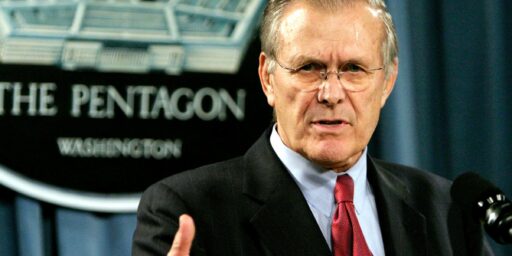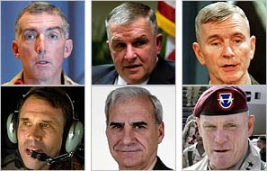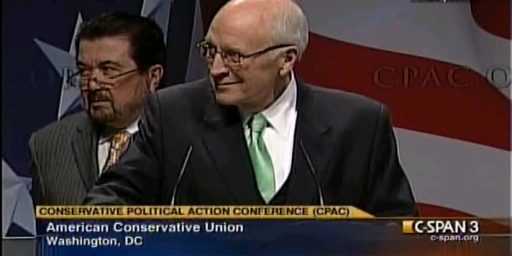Bush: Still ‘War on Terror’
President Bush made clear, by using the phrase five times in a speech yesterday, that “war on terror,” not some formulation avoiding the use of the word “war,” is how his administration will describe the fight against Islamist terrorists.
President Makes It Clear: Phrase Is ‘War on Terror’ (NYT RSS)
President Bush publicly overruled some of his top advisers on Wednesday in a debate about what to call the conflict with Islamic extremists, saying, “Make no mistake about it, we are at war.” In a speech here, Mr. Bush used the phrase “war on terror” no less than five times. Not once did he refer to the “global struggle against violent extremism,” the wording consciously adopted by Defense Secretary Donald H. Rumsfeld and other officials in recent weeks after internal deliberations about the best way to communicate how the United States views the challenge it is facing.
In recent public appearances, Mr. Rumsfeld and senior military officers have avoided formulations using the word “war,” and some of Mr. Bush’s top advisers have suggested that the administration wanted to jettison what had been its semiofficial wording of choice, “the global war on terror.” In an interview last week about the new wording, Stephen J. Hadley, Mr. Bush’s national security adviser, said that the conflict was “more than just a military war on terror” and that the United States needed to counter “the gloomy vision” of the extremists and “offer a positive alternative.” But administration officials became concerned when some news reports linked the change in language to signals of a shift in policy. At the same time, Mr. Bush, by some accounts, told aides that he was not happy with the new phrasing, a change of tone from the wording he had consistently used since the attacks of Sept. 11, 2001.
It is not clear whether the new language embraced by other administration officials was adopted without Mr. Bush’s approval or whether he reversed himself after the change was made. Either way, he planted himself on Wednesday firmly on the side of framing the conflict primarily in military terms and appeared intent on emphasizing that there had been no change in American policy.
I’ve never been happy with the phrase “war on terror” because one can not eradicate a reaction with military force. Our enemy is not “terror” or even “terrorism” but rather radical Islamists. Unless we find a way to rid the world of the madrassas and other breeding grounds for fanatics, terrorists will continue to multiply as their brothers are killed, much like the mythical Hydra.
Bush is right, though, that we are indeed at war and the alternative phrasing of Rumsfeld and Hadley does no better at capturing the essence of the fight while also being wordier and less elegant.
The irony here is that the policy implications of what Hadley, especially, is quoted as saying above is not new at all. Despite the cries of the critics that the administration is trying to fight only using military means, the truth of the matter is that there have been, from the beginning, all manner of initiatives aimed precisely at getting at the “root cause” of the problem. Indeed, even the controversial war in Iraq is predicated largely on the premise that democratization of the Arab Middle East is the only way to win the “war on terror.”





I’m glad Bush is clear on this — too bad his advisors, including Rummy (one of my favs), sort of blew it.
I think if you don’t like “war on terror”, you should advocate an alternative, or admit you don’t have one, any time to note you don’t like it.
I don’t like it much — don’t have anything better.
I’d prefer a War for Democracy, but the Dems wouldn’t support such a costly thing; maybe even Reps wouldn’t either.
Obviously all is not smooth within the administration, if something high-profile like this isn’t getting cleared before the Pentagon runs with it.